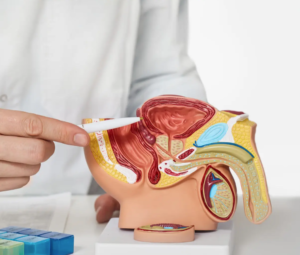Enlarged Prostate? Discover Natural Ways to Shrink It and Other Treatment Options

Enlarged Prostate? Discover Natural Ways to Shrink It and Other Treatment Options
Over 40 and Battling an Enlarged Prostate? Don’t Despair! Explore Natural Remedies, Medical Treatments, and Self-Care Strategies
Hitting your 40s and beyond might bring some unwelcome surprises – and an enlarged prostate could be one of them! That constant need to use the bathroom, the weak stream, the feeling that your bladder never quite empties… it’s frustrating! But don’t worry; you’re not alone. Benign prostatic hyperplasia (BPH) is a widespread condition that affects millions of men as they age. The good news is, there are plenty of ways to manage it.
Let’s dive into the world of enlarged prostates, exploring options ranging from natural remedies and lifestyle changes to medical treatments.
Understanding Your Enlarged Prostate
What on Earth is BPH?
Benign prostatic hyperplasia, or BPH, simply means your prostate is larger than it should be. It’s like a balloon slowly inflating over time. Your prostate, a walnut-sized gland, sits right below your bladder and surrounds your urethra (the tube that carries urine). As it grows, it can squeeze the urethra, causing all those annoying bathroom issues.
Why Does This Happen?
Think of BPH as a natural part of the aging process for most men. Hormonal changes, particularly a shift in the balance between testosterone and dihydrotestosterone (DHT), play a major role. Family history and certain medical conditions can also increase your risk.
Should I Be Worried?
While BPH itself isn’t dangerous, it can significantly impact your quality of life. Untreated, it could lead to complications like urinary tract infections (UTIs) or kidney damage. So, if you’re experiencing symptoms, talk to your doctor.
Natural Ways to Shrink an Enlarged Prostate
1. The Power of Plants for Your Prostate
Nature holds many potential allies in your battle against BPH. Let’s explore some popular options:
- Pygeum Africanum: Extracted from the African prune tree, this supplement shows promise in reducing BPH symptoms.
- Saw palmetto: A popular choice, but research evidence on its effectiveness is mixed.
- Beta-sitosterol: This plant-based compound might improve urine flow.
2. Can Dr. Sebi Cure An Enlarged Prostate?
The late Dr. Sebi advocated for a specific alkaline diet and herbs to treat various health conditions, including BPH. While some men report benefits, it’s important to note that scientific evidence supporting this approach is limited. Always consult your doctor before making significant dietary changes or relying solely on alternative therapies.
3. Dietary Changes: Your Prostate-Friendly Plate
What you eat matters! Here’s how to support your prostate health:
- Fill up on fruits and veggies: Aim for a rainbow of colors.
- Choose whole grains: Swap refined grains for brown rice, quinoa, and whole-wheat bread.
- Healthy fats are your friend: Think avocados, nuts, and fatty fish.
- Cut back on red meat and dairy: These can increase inflammation.
- Limit sugary drinks and processed foods: They’re bad news all around.
4. Lifestyle Adjustments for a Happy Prostate
Small shifts in your daily routine can make a big difference:
- Exercise regularly: Aim for at least 30 minutes of moderate-intensity exercise most days of the week.
- Maintain a healthy weight: Extra pounds put a strain on your prostate.
- Limit alcohol and caffeine: These can irritate your bladder.
- Manage stress: Look for healthy stress-relief techniques.
- Train your bladder: Try scheduled bathroom breaks.
FAQs: Your Enlarged Prostate Questions Answered
 1. I think I have an enlarged prostate. Can it be dangerous?
1. I think I have an enlarged prostate. Can it be dangerous?
While BPH itself isn’t dangerous, it’s important to see your doctor for a diagnosis and discuss treatment. Untreated BPH can sometimes lead to complications like urinary tract infections or kidney problems.
2. I’ve heard about natural treatments for BPH. Do they really work?
Some natural remedies, like Pygeum Africanum, Saw Palmetto, and Beta-Sitosterol, show potential in managing BPH symptoms. However, it’s crucial to talk to your doctor before starting any supplements, especially if you take other medications.
3. Can changing my diet help with an enlarged prostate?
Absolutely! A healthy diet plays a major role in prostate health. Focus on fruits, vegetables, whole grains, and healthy fats. Limit your intake of red meat, dairy, processed foods, and sugary drinks.
4. Are there any lifestyle changes that can help manage BPH symptoms?
Yes! Regular exercise, maintaining a healthy weight, reducing your intake of alcohol and caffeine, managing stress, and practicing bladder training can all make a difference.
5. What about Dr. Sebi’s approach to treating an enlarged prostate?
While some people have found benefits from Dr. Sebi’s specific diet and herbal recommendations, it’s important to understand that scientific support for this approach is limited. Always talk to your doctor before drastically changing your diet or relying solely on alternative therapies.
Disclaimer:
The information provided in this article is intended for general knowledge and informational purposes only, and does not constitute medical advice. It is essential to consult a qualified healthcare professional for diagnosis and treatment of any health condition. Never disregard professional medical advice or delay in seeking it because of something you have read in this article.

